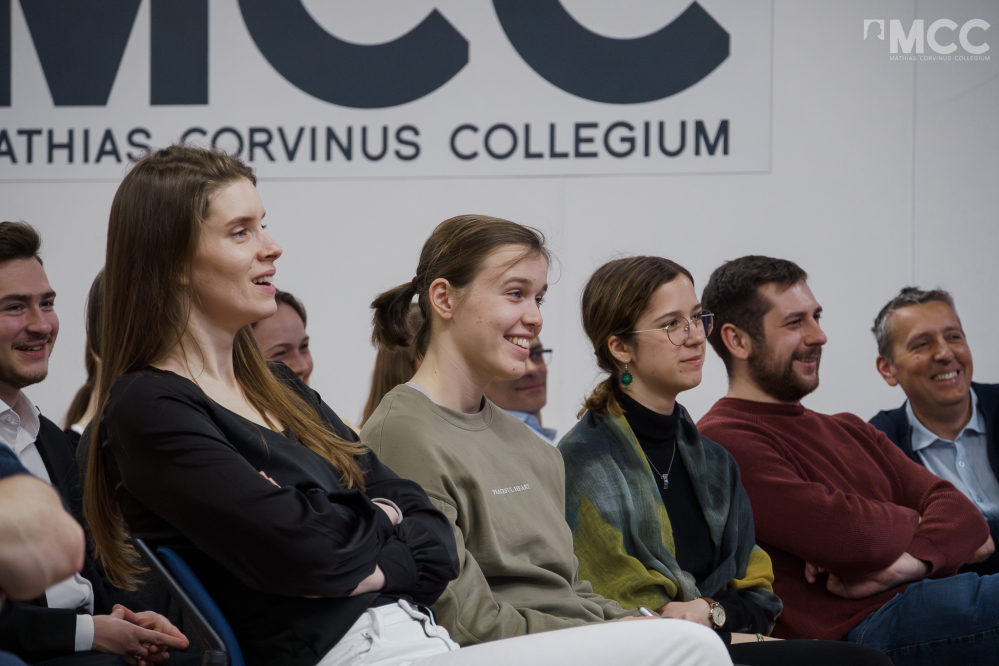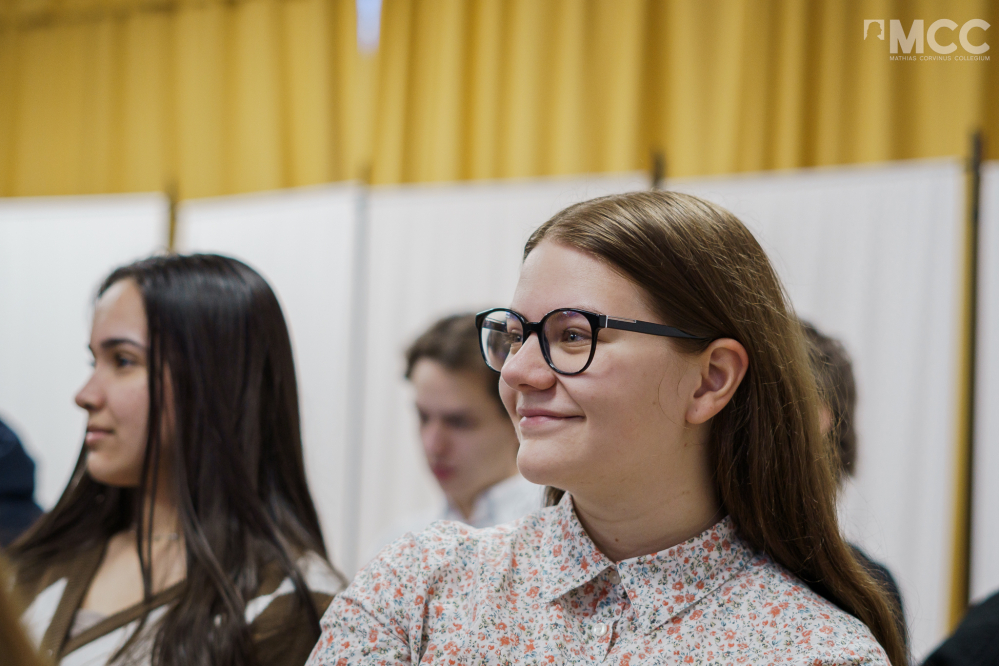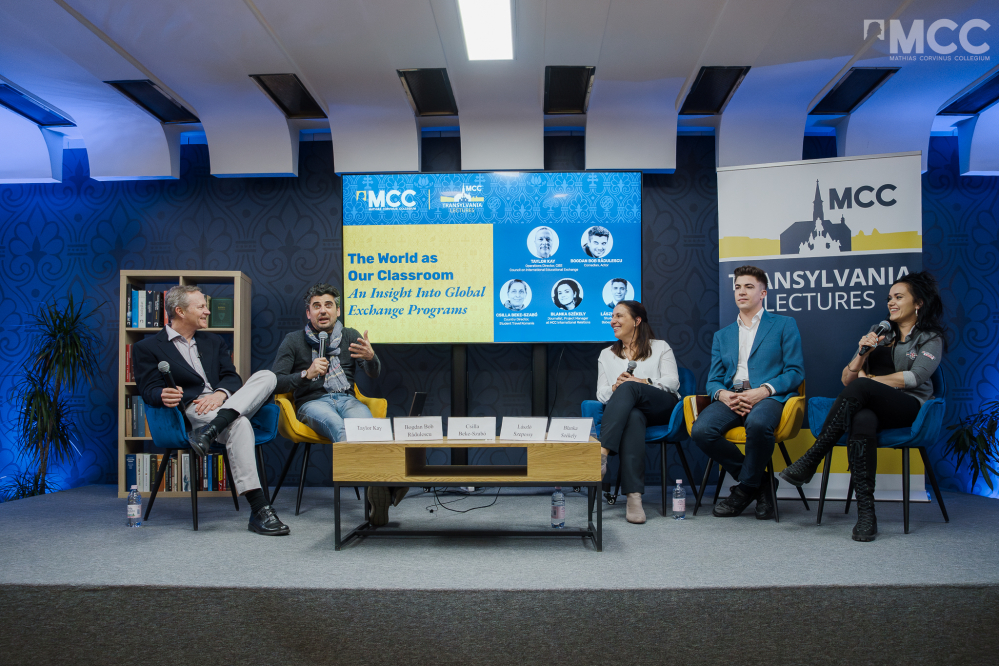Reading time: 5 minutes
As our world grows more and more interconnected, the value of international exchange programs increases as well. These can act as bridges that connect cultures, enhance career growth and foster international understanding. Participants of these programs not only get the chance for personal growth and learning, but also offer wider career opportunities and expand professional networks across borders.
The latest edition of Mathis Corvinus Collegium’s (MCC) Transylvania Lectures on the 26th of Match brought forth not only the aforementioned topics, but beyond individual growth, touched on collective benefits and challenges faced by individuals and communities invested in these sorts of international exchanges. The discussion brought together a diverse team of people. Among our guests were Taylor Kay, Operations Director of Seasonal Exchanges at the Council on International Education Exchange (CIEE), the worldwide leader in exchange programs; Bogdan Bob Rădulescu, actor, entrepreneur, former US intercultural exchange program participant; Csilla Beke-Szabó, Country Director at Student Travel Romania, László Szepessy, economics student and member of MCC. The moderator of the discussion was Blanka Székely, a television journalist and team member of MCC International Relations.
Historically exchange programs were put into action in order to reunite the people of the world after the destruction of World War II. Starting from 1961, the United States began to create opportunities for its young citizens to board a ship and gain experience in countless countries across the globe – and though the mode of transportation changed, the motivation behind this practice remained the same: bringing people together, building new relationships and an international community. In the beginning the majority of participants went to the US from Western Europe, however, after the fall of the USSR, the will to participate in such programs became evident in Eastern regions as well. Implemented laws such as the Fulbright-Hays act of 1961 and institutions such as Bridge USA have made it possible for millions of people to gain knowledge and experience throughout the decades through traveling and working abroad.
Taylor Kay’s mission for the past many years at CIEE has been precisely this. Though throughout the times, there were outside factors that hindered the steady flow of international workers entering and leaving the US (the 9/11 attack, the great recession and more recently COVID-19), programs such as Work & Travel always bounced back, proving the necessity and benefits of its existence.
Work & Travel is a program meant for full time students who are willing to use their summer break to work in the US, after which they can take another month to travel at their leisure. Blanka Székely, who also participated in such programs, pointed out that the aim isn’t to move abroad, but to gain as much new knowledge and perspective as possible, and then bring all of these back and leverage it in one’s home country.
And what do participants gain? All our guest speakers agreed that among many others, they all ended their experience with improved English skills, more confidence and extra money, and it could also benefit them in their educational path. In the long term, these young people become successful business owners, leaders and an integral part of their community. The programs are also beneficial for the employees, since they get a big influx of people depending on the season, they benefit from the diversity of an international community. Locals take the newcomers under their wings and try to give them as warm a welcome as possible.
László Szepessy, still a graduating student at Babeș-Bolyai University, was already able to earn priceless experiences through the opportunities provided by MCC. He presented the institution’s international scholarships like the Mobility+, the Fellowship Program or the Training Grant. Szepessy spent three months in Cape Town conducting research on sustainability, but many more MCC students got to learn abroad. In the last semester students visited institutions in Austria, Azerbaijan, Hungary, Italy, the Netherlands, Poland, Sweden and Turkey. He added, “Exchange programs also give you an opportunity to represent your country and region and celebrate it with others.”
Bogdan Bob Rădulescu described the six summers he spent in the United States as a big adventure, adding that: “I would not be the same person today, if it wasn’t for those six years”. Csilla Beke-Szabó has a 27 years history of working in the cultural exchange and travel industry. When asked about the best part of her job, she shared that it is when, at the end of the season, students come back and she get to hear their stories, and lots of positive feedback. She also loves to hear the success stories of past participants, where they ended up in life and how their experience working in the US helped them achieve their goals. The director added that the way they organize the trips has become easier and more accessible over the years, but the enthusiasm of young people has not wavered.
As a piece of advice for young people today, Taylor Kay suggests: “When in doubt, say yes.” He advises students to be open to new opportunities and to volunteer, even if they think they are not good in their field of interests, since we can only gain knowledge from these experiences. Csilla Beke-Szabó suggested not to overthink the decision and the planning – the time and money invested in this venture will come back tenfold to those who take part in it.





